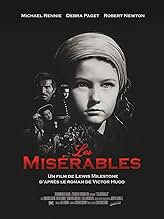In dieser mitreißenden Adaption des klassischen Epos überzeugt Michael Rennie, der kurz zuvor im Sci-Fi-Klassiker "Der Tag, an dem die Erde stillstand“ für Furore sorgte, als Jean Valj... Alles lesenIn dieser mitreißenden Adaption des klassischen Epos überzeugt Michael Rennie, der kurz zuvor im Sci-Fi-Klassiker "Der Tag, an dem die Erde stillstand“ für Furore sorgte, als Jean Valjean.In dieser mitreißenden Adaption des klassischen Epos überzeugt Michael Rennie, der kurz zuvor im Sci-Fi-Klassiker "Der Tag, an dem die Erde stillstand“ für Furore sorgte, als Jean Valjean.
- Valjean's Coachman
- (Nicht genannt)
- Courtroom Spectator
- (Nicht genannt)
- Cicely
- (Nicht genannt)
- Revolutionary
- (Nicht genannt)
- Student
- (Nicht genannt)
- Judge
- (Nicht genannt)
- Gendarme
- (Nicht genannt)
Handlung
WUSSTEST DU SCHON:
- WissenswertesElsa Lanchester, who plays Madame Magloire, was married to Charles Laughton, the Etienne Javert of the 1935 version of Die Elenden (1935).
- PatzerAs part of his prison sentence, Jean Valjean and his fellow convicts are used as galley rowers aboard a ship. France discontinued this practice in 1748, more than half a century before this story takes place. The use of the term "galley" as slang for prison continued in France, hence its use in the original novel upon which this film is based, which may have led to confusion among English speakers when adapting the story.
- Zitate
Etienne Javert: I pride myself on being a good officer.
Jean Valjean: That's very good. Only I'm afraid you'll get little practice here, Inspector Javert. We're a quiet town.
Etienne Javert: I have heard this, yet there is crime everywhere, monsieur.
Jean Valjean: And filth also if one looks hard enough.
Michael Rennie and Robert Newton are fine actors, but their performances here are no match for Fredric March and Charles Laughton in the earlier film; though Newton is remarkably restrained, his role has been somewhat diminished to accommodate the sappy romance involving Debra Paget and Cameron Mitchell! Besides, it’s compromised by the loss of two small but important scenes from the 1935 version which, in this case, robs the character of essential depth: a) when Javert is humiliated by his peers for his lowly background, and b) when he blackmails newly-appointed Mayor Jean Valjean, a former convict, in his office; unbelievably, it substitutes the first by having Javert’s own father serve a prison sentence on the galley to which he’s himself assigned!
Other conceptual flaws include: Edmund Gwenn’s pivotal role of the Bishop, which comes off as whimsical alongside Cedric Hardwicke’s haunting turn in the earlier film; Valjean is depicted as an illiterate who receives schooling from the intellectual played by Joseph Wiseman (his Method approach feels out of place in a 19th century French setting!); Javert’s conscience-stricken demise here is, disconcertingly, brought about by his brief conversation with James Robertson Justice (as Valjean’s right-hand man); missing from the narrative, though, is the poignant character of Eponine (whose role gave a plausible melancholia to the romantic angle in the 1935 film).
Ultimately, I wouldn’t call the 1952 LES MISERABLES unnecessary, considering that it’s made with undeniable professionalism and the fact that countless other film versions have followed it; perhaps, the late eminent critic Leslie Halliwell summed it best in his claim that it’s “lacking the spark of inspiration”.
- Bunuel1976
- 27. Mai 2007
- Permalink
Top-Auswahl
Details
- Erscheinungsdatum
- Herkunftsland
- Sprachen
- Auch bekannt als
- Les Miserables
- Drehorte
- Produktionsfirma
- Weitere beteiligte Unternehmen bei IMDbPro anzeigen
Box Office
- Weltweiter Bruttoertrag
- 296.662 $
- Laufzeit1 Stunde 45 Minuten
- Farbe
- Seitenverhältnis
- 1.37 : 1
Zu dieser Seite beitragen




























